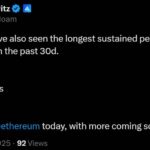In an exciting development for both traders and the cryptocurrency market, Robinhood is reportedly working on a blockchain-based program aimed at enabling European traders to invest in U.S. financial assets. According to information shared with Bloomberg, the platform is exploring three blockchain options: Arbitrum (ARB), Ethereum (ETH), and Solana (SOL), and will be developed in partnership with a digital asset firm.
The concept of tokenization is gaining significant traction among traditional financial firms, as it offers a way to convert physical assets into digital tokens on the blockchain. This innovative approach not only enhances data security but also facilitates quicker transaction settlements and boosts liquidity. Analysts suggest that the tokenized asset market could expand exponentially, potentially reaching an impressive $23.4 trillion by 2033.
“Tokenization has the potential to democratize access to investments, allowing ordinary investors to engage with private markets like never before,” noted industry experts.
Despite the promising advantages that tokenization could bring, Robinhood’s CEO Vlad Tenev has expressed concerns about the current regulatory landscape in the United States. He criticizes the lack of clear guidelines for security token registration, asserting that these regulatory hurdles are stifling the industry and preventing significant financial innovations that could broaden investment opportunities for everyday individuals.

Robinhood’s Blockchain Initiative: Expanding Access to U.S. Financial Assets
Robinhood’s development of a blockchain-based trading program for European users presents several key implications for investors and the financial landscape.
- Access to U.S. Financial Assets:
This initiative aims to broaden the investment opportunities for European traders by giving them access to U.S. financial assets, potentially diversifying their portfolios.
- Utilization of Multiple Blockchains:
Robinhood is considering incorporating well-known blockchains such as Arbitrum (ARB), Ethereum (ETH), and Solana (SOL) for the platform, which may enhance stability and security.
- Partnership with Digital Asset Firms:
The collaboration with a digital asset firm could bring expertise and resources that may foster a more robust tokenized trading environment.
- Tokenization’s Market Growth:
With forecasts estimating the tokenized asset market to reach $23.4 trillion by 2033, the trend emphasizes the increasing importance and recognition of digital assets in the traditional finance sector.
- Benefits of Tokenization:
- Increased data security
- Faster transaction settlements
- Enhanced liquidity of assets
These benefits could lead to a more efficient trading experience for investors.
- Regulatory Challenges:
CEO Vlad Tenev has criticized the lack of clear U.S. regulations regarding security token registration, indicating it hinders progress in democratizing access to private-market investments.
The move towards blockchain technology in finance represents a significant shift, pushing traditional firms and investors to adapt to a rapidly evolving landscape.
Robinhood’s Blockchain Ambitions: Shaping the Future of Financial Accessibility
Robinhood’s latest endeavor to create a blockchain-based program aimed at providing European traders with access to U.S. financial assets is a bold step into the evolving digital financial landscape. This initiative places the company at the forefront of a rapidly expanding market characterized by tokenization, which is increasingly appealing to traditional financial institutions. With three significant blockchains—Arbitrum, Ethereum, and Solana—under consideration, Robinhood is strategically positioning itself to maximize both security and transaction efficiency.
One of the main competitive advantages of Robinhood’s initiative lies in its potential to enhance the liquidity and accessibility of financial assets. As tokenization enables the digitization of traditional assets, it offers everyday investors the opportunity to participate in markets previously out of reach. The forecast suggesting that the market could balloon to $23.4 trillion by 2033 is not merely speculative; it underscores the shifting dynamics of investment strategies and asset management.
However, Robinhood is venturing into a space filled with both promise and peril. The very regulatory hurdles that CEO Vlad Tenev criticized pose a significant disadvantage as the company pushes forward. The lack of clarity surrounding the registration of security tokens in the U.S. could hinder expansion efforts, complicate compliance, and foster distrust among potential users wary of a volatile regulatory environment. This could create obstacles for Robinhood, particularly in gaining consumer trust in a competitive landscape where established financial entities may already have the advantage of regulatory certainty.
This news could greatly benefit tech-savvy investors and cryptocurrency enthusiasts in Europe who seek diversification opportunities beyond their local markets, as tokenized assets can democratize access to high-value U.S. equities. Conversely, the initiative could pose challenges for traditional financial firms that may feel threatened by the disruptive nature of tokenization and the potential for a more level playing field, which Robinhood’s program could facilitate. As the sector evolves, traditional players may need to adapt rapidly to maintain competitiveness against such innovative platforms.
In summary, while Robinhood’s blockchain venture offers substantial potential to transform the investment landscape, it also must navigate a complex web of regulatory challenges and market perceptions. As the interest in tokenization grows, industry participants must remain vigilant and ready to adapt to the changes ahead.















